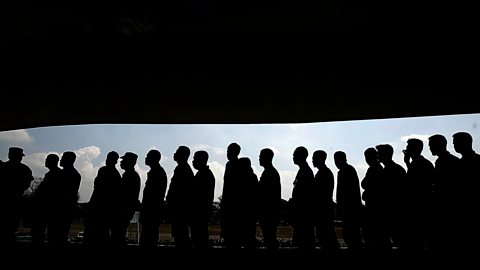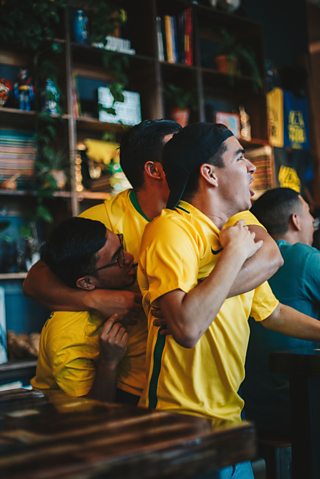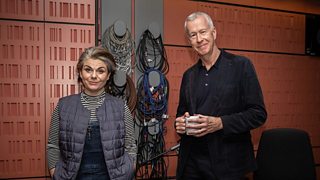How a yoga enthusiast and a football fan became βradicalisedβ
In each episode of The Flipside, Paris Lees tells two stories from opposite sides of the coin, and uses science to ask questions about elements of the human experience that we sometimes take for granted.
In Going to the Extreme Paris explores how people get devoted to groups. What makes us join forces with others and dedicate our lives to something bigger – and when does it go too far? Could you be radicalised? Paris talks to a former yoga enthusiast who realised her community was verging on “cult”, and a football fan who would go to extremes to see his team win the league.

Going to the extreme
Paris Lees talks to a former yoga enthusiast who realised her community was a little too cult-ish for her liking, and an extreme football fan: Listen to Going to the extreme.
What is radicalisation?
"Radicalisation is basically a change in moral community. That could just be a religious conversion; that could be people changing political sides. When people switch moral communities in general, it's because whatever moral community they were in to begin with was not giving them everything they were looking for." – Cognitive scientist Dr. Nafees Hamid
My first impression was: "this doesn’t seem like yoga"
Alex had a complicated childhood in Michigan, which left her with a lot of unresolved trauma. She spent her twenties moving around the US, but was hungry to see the rest of the world.

“I decided that I was going to start planning for a trip and for my 30th birthday, I got myself a passport,” Alex recounts. She “fell in love with Europe” and found work in Prague. But with mounting credit card debts she came to the “disheartening” and “sad” realisation that she would have to return home.
Alex moved in with some friends in Chicago and got a temp job in the city. That’s where she came across the yoga studio: “One day I was coming out for lunch and I happened to notice this billboard across the street that said ‘Dahn yoga’.”
“My first impression was, this doesn’t seem like yoga,” says Alex. They had one or two yoga poses, but classes mostly involved beating on your chest, “vibrations in the body”, dancing to music and chanting. “But I kept going because I had paid for a package,” she says.
There was so much love in the room… it was very addictive
Soon, however, it was the instructors, the other attendees and the feelings they instilled in her that kept Alex going back. “Everyone was very welcoming, very warm,” she recalls. They would hug each other. “It felt really good and supportive.”
“They had weekend classes that was all about healing past pains, or dealing with negative feelings and emotions,” says Alex. “I signed up for a couple of those and they were really positive emotional events… There was so much love in the room. It was just a lot of really positive affirmations being thrown at us by each other... It was very addictive.”
There was “a lot of pumping me up, a lot of good vibrations, good affirmations”
When it was first suggested to Alex that she become a teacher, she was hesitant. “I didn’t really have a desire to move up the hierarchy,” she says. But leaders in the organisation were “very persuasive”, saying she’d make good money. And as she was trying to save for her own place, it began to seem like a good solution. When they hit her with the price tag of “at least a couple of thousand dollars”, she thought she was out of the running. Instead, they suggested that when she started teaching, they could put her wages towards the cost of training.
They told her they would take care of her; that she was making people feel great. There was “a lot of pumping me up,” says Alex. “A lot of good vibrations.” And so, she went ahead. “I thought it would just be this temporary thing that would then start reaping me some money to get out on my own,” she states.
That’s the moment it hit me… ‘Oh my gosh, I think I’m in a cult’
Then on the teaching retreat in Sedona, Arizona, it all got decidedly weird.
Alex didn’t know anything about Dahn Yoga’s founder, Dr Ilchi Lee, but others kept “acting like this guy was the second coming of Christ,” she says. When they finally got to meet him, they were ushered into a room with a dais, a “throne-like” chair, huge flowers and a red carpet running off to a door at the side, through which she glimpsed a parked Humvee. Lee arrived wearing an expensive looking white suit, a huge gold watch and chains. “The man looked like money,” Alex recalls.
What she saw when she looked around the room was people in rapture of the man sitting before them. “That’s the moment it hit me,” says Alex, “I’m like, ‘Oh my gosh, I think I’m in a cult.’”

Following leaders to the extreme
Paris Lees talks to cognitive scientist Dr. Nafees Hamid about devotion to leaders.
"When people feel like they have a strong sense of community it gives them genuine guidance, some sort of esteem, a sense of identity. A sense of certainty as well, which is what a lot of religions also offer... It gives them an explanation of the world, a way to navigate it, as well as agency: there are rituals, tradition, ceremonies. There's something they can actually do on a day-to-day basis with their lives." – Dr. Hamid
Nothing comes close to the atmosphere you’ll get at a football match
Robbie Lyle is absolutely devoted to football: “I love watching football… I just love the skill of the players. It’s just an exciting game to watch. And then as a person watching it in the ground, nothing comes close to the atmosphere you’ll get at a football match,” he says.

Robbie began supporting Arsenal football club when he was a child. His cousins were all Arsenal fans and they encouraged him to join them. “As soon as I went to watch Arsenal play in my first game, that was it: I’m an Arsenal fan; I was hooked,” he recalls. “It’s almost like overnight you’ve become a fan.”
And in this country, once you’ve become a supporter, “that’s your club for life, you can’t change,” he explains.
The game starts days before the actual kick-off
Football takes up a huge proportion of Robbie’s week. “The game starts days before the actual kick-off because you have the build-up amongst fans,” he says. On match day, he meets up with friends a couple of hours before the game for a drink, and then after the final whistle they continue to discuss it. “We’ll spend a couple of days at least talking about that game,” says Robbie.
Robbie has also made football his career. He set up AFTV in 2012, which calls itself the largest football fan network in the world. It started as a YouTube channel and he soon had to leave his job to run it. Now 1.35 million subscribers watch him and his colleagues analyse and discuss Arsenal, while he follows the team to games around the world. “I wanted to be able to give fans a chance to have their say,” says the channel’s founder.
It’s been described by many people as being like you’re part of a cult
“It’s been described by many people as being like you’re part of a cult,” says Robbie. “Maybe cult’s too strong,” he admits, “but it’s a bit like when you go to church. You’re a member of a church. And you go to that church every Sunday. It’s the same with football. It’s like a religion.”
“I know fans, they’ve not missed a game for like 30, 40 years… Weddings come up and they’ve cancelled it. They’re just totally crazy for Arsenal.”
It’s very tribal too, says Robbie: “You do feel that sense of belonging.” At a game, if your team scores, you’re jumping up and down, you’re hugging people. “You don’t even know who they are – it’s just a fellow Arsenal fan.”
Robbie has made being a fan his whole life. He’s rationally realised there are more positives than negatives. But it wasn’t the same for Alex, who realised she’d been radicalised by the wrong crowd…
I never thought I would fall victim to that
After her epiphany on the training retreat, Alex started plotting her escape: “I will work as a teacher until I’ve paid my debt off, and then I’m out,” she promised herself.
“It took several months of me working three days a week,” she says. Now enlightened, she would pay a little more attention to the people who took the class. “There was a lot of very hurt people, very needy people,” she realised. “They needed some positive attention, some positive reinforcement, validation.”
It was a big “eye opener”. She’d learnt about cults as a kid and presumed there was a certain way that a person would be recruited. “I never thought that I would be subject to that or that I would fall victim to that,” she admits.
“All they need to do is show you affection, show you support, show camaraderie… They dress it up that they’re helping you be the better version of yourself, and if you’re at a low enough point, where you feel like you don’t have that, you can totally fall victim to it.”
"Radicalisation is the ability to press reset on the video game of life and to come back as a better character. Whether it's QAnon or jihadists or white nationalists, or any other cult, they are basically offering you significance, respect, love, esteem and the moral values are the cost of entry into that group." – Dr. Hamid

The Flipside
-
![]()
Things Fell Apart: Jon Ronson
1974. A church minister's wife in West Virginia learns of a brand new curriculum being introduced into her children's school. So she decides to read all 325 new textbooks herself.
-
![]()
This Cultural Life
Author and columnist Caitlin Moran talks to John Wilson about some of the works and events that have had the biggest influence on her writing career.
-
![]()
No Place But The Water
Second series Linda Marshall Griffiths' climate emergency drama set in a flooded future world.
-
![]()
Harland
Lucy Catherine's supernatural thriller set in the new town of Harland, built on the site of a village abandoned 900 years earlier. DI Sarah Ward returns to work to investigate the disappearance of a child.




